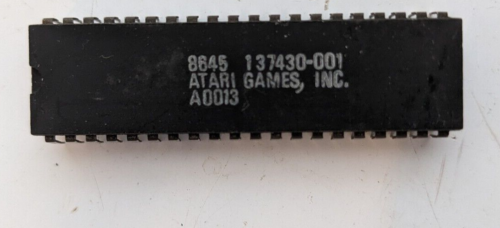
February
Atari POKEY
The Atari POKEY (Pot Keyboard Integrated Circuit) chip was a sound and I/O chip used in many Atari arcade games and home consoles of the 1980s. The POKEY chip was an important part of Atari’s hardware architecture, and helped to create the distinctive sound and gameplay experience that Atari is known for.
The POKEY chip was a versatile chip that could perform several functions. One of its main functions was to generate sound effects and music for games. The chip had four channels, each of which could produce a different sound effect or musical note. The chip used a combination of waveforms, filters, and envelope generators to create a wide range of sounds, from simple beeps to complex musical compositions.
Another important function of the POKEY chip was its input/output capabilities. The chip had eight digital I/O pins, which could be used to read input from external devices such as joysticks or buttons. The chip also had two analog inputs, which could be used to read analog signals such as paddle controllers or potentiometers.
The POKEY chip communicated with the rest of the Atari hardware using a parallel bus interface. The bus interface allowed the chip to communicate with other chips and devices on the board, such as the CPU or the video display. The POKEY chip also had a memory-mapped I/O interface, which allowed software to access its registers and control its functions.
One of the key advantages of the POKEY chip was its speed. The chip was designed to operate at high speeds, with a clock speed of up to 2 MHz. This allowed it to perform its functions quickly and efficiently, and helped to create the fast-paced and responsive gameplay that Atari games were known for.
In conclusion, the Atari POKEY chip was a versatile and important part of Atari’s hardware architecture. Its sound and I/O capabilities helped to create the distinctive gameplay and sound experience that Atari games are known for. The chip’s speed and efficiency made it an ideal component for arcade games and home consoles, and helped to cement Atari’s place as a pioneer in the world of gaming.